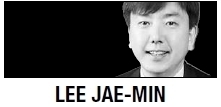 When it rains, it pours. And it pours heavily. As if not to be sidelined by domestic disarray, foreign woes are flooding the first week of the new year. Diplomatic friction with neighboring countries is now biting us where it hurts most: the faltering economy.
When it rains, it pours. And it pours heavily. As if not to be sidelined by domestic disarray, foreign woes are flooding the first week of the new year. Diplomatic friction with neighboring countries is now biting us where it hurts most: the faltering economy.THAAD-angered Beijing continues to ratchet up its economic retaliation against Seoul. As the THAAD deployment has now become a signature issue of the Korea-US alliance, Seoul is simply unable to undo its official decision. For its part, China will continue to draw from its playbook different cards of economic bashing – at least for the time being.
The economic sanction from Tokyo at the start of the new year could not have come at a more painful time. Tokyo has suspended the currency swap negotiation with Seoul. Bilateral economic meetings have also been called off. And more will be on the way, depending upon how Seoul responds.
Tokyo complains that Seoul has failed to honor what was agreed in the Comfort Women Settlement agreement in December 2015 by not taking necessary action on a new statue in front of the Japanese Consulate General in Busan. Seoul counters with its own complaints. Japan seems to be determined to play its economic pressure card -- also at least for the time being.
The double bashing from the two neighbors is not good news for the already battered Korean economy struggling to emerge from an economic recession. It’s quite symbolic too: do we ever recall an instance where Korea faced economic squeezing from both sides of the peninsula at the same time? The neighbors must know that economic sanctions are a particularly effective way to drive their diplomatic agenda at this juncture. The two countries seem ready to dial up the level of sanctions when pending diplomatic issues do not proceed as they desire -- a sad reality for Korea, which has to rely upon them for many aspects of its economy.
The problem is, many of these retaliatory sanctions do not lend themselves to an easy challenge by Korea. They are mainly refusals to cooperate or to extend favorable consideration. Consider China’s recent refusal to provide charter flight permissions to Korean carriers. Look at Japan’s termination of negotiations for a foreign exchange swap. Refusing to cooperate is usually a permissible policy option for a sovereign state unless there is a treaty or something that dictates otherwise. Other countries can complain, but it pretty much depends upon a state’s own decision.
It is an illusion to believe that Korea is entitled to a cordial friendship from other countries. The only leverage would be to have those other countries realize that economic retaliation does not necessarily work vis-a-vis Korea, and that economic sanctions could harm their own interests as well. This is where diplomacy comes in.
In an ideal world, the machine of diplomacy would work diligently by now. National leadership would take this development as a serious issue, and mobilize all leverage available. Since national leadership is an item that is temporarily out of stock, perhaps Korea can only repeat what is already stated and ask other countries to refrain from resorting to economic retaliatory measures. In the face of the two-way squeeze, and at the time a key national decision is most needed, the next several months of sheer uncertainty could be an eternity for Korea.
Likewise, in an ideal situation, the two neighbors would not have taken such an aggressive approach even if there were issues of disagreement with Korea. Sensitive issues would have been dealt with quietly and deliberately. Any pretense of such subtlety seems to be gone now. That is more concerning and it bodes ill for managing future relations.
The year 2016 was one of the worst years in Korea’s modern history. If 2017 continues at its current pace, this year may beat it.
By Lee Jae-min
Lee Jae-min is a professor of law at Seoul National University. He can be reached at jaemin@snu.ac.kr. — Ed.
-
Articles by Korea Herald




![[Herald Interview] 'Amid aging population, Korea to invite more young professionals from overseas'](http://res.heraldm.com/phpwas/restmb_idxmake.php?idx=644&simg=/content/image/2024/04/24/20240424050844_0.jpg&u=20240424200058)












![[KH Explains] Korean shipbuilding stocks rally: Real growth or bubble?](http://res.heraldm.com/phpwas/restmb_idxmake.php?idx=652&simg=/content/image/2024/04/25/20240425050656_0.jpg&u=)

